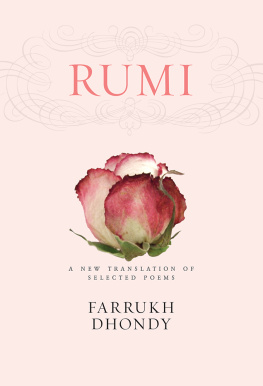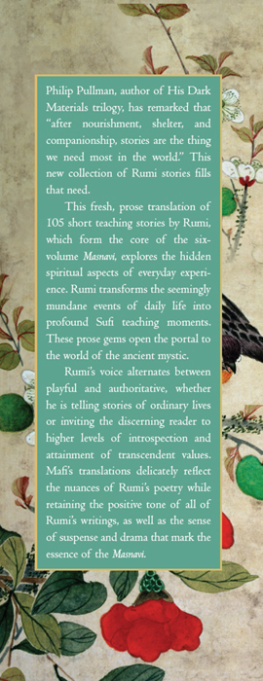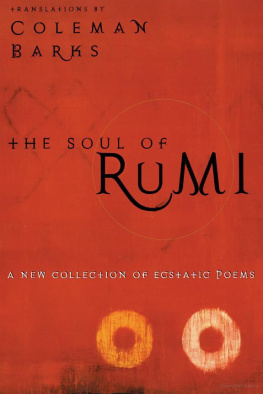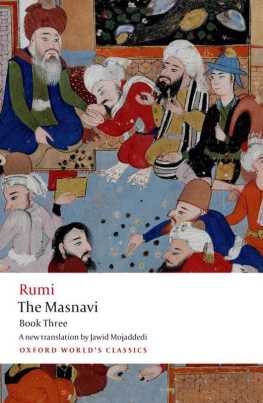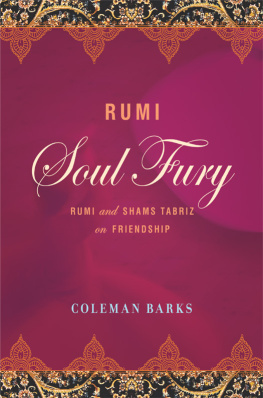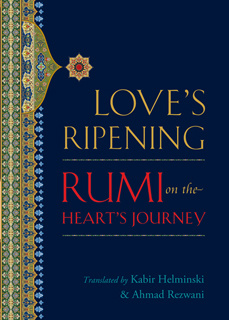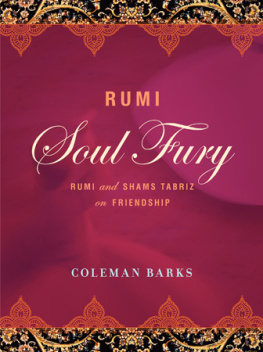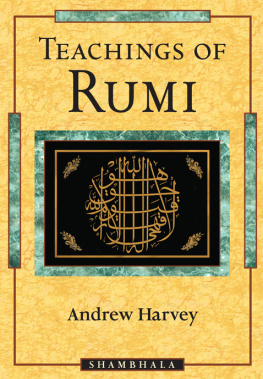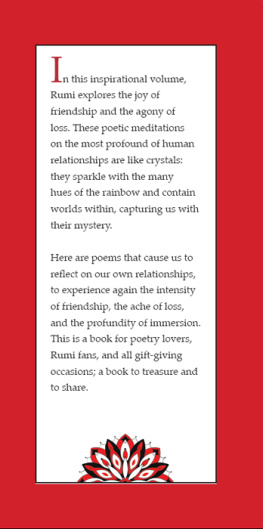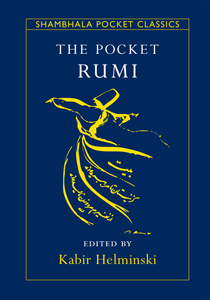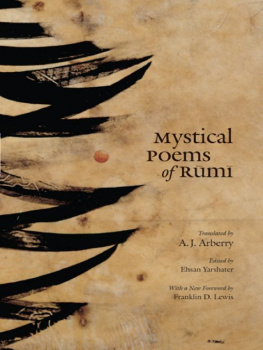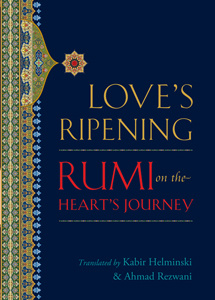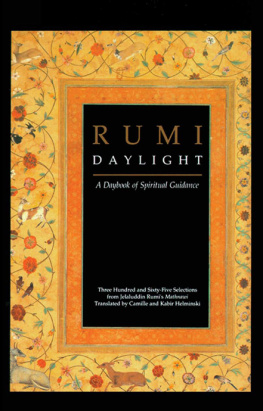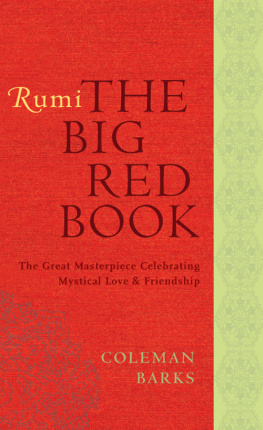Rumi - Rumi: A New Translation of Selected Poems
Here you can read online Rumi - Rumi: A New Translation of Selected Poems full text of the book (entire story) in english for free. Download pdf and epub, get meaning, cover and reviews about this ebook. year: 2013, genre: Art. Description of the work, (preface) as well as reviews are available. Best literature library LitArk.com created for fans of good reading and offers a wide selection of genres:
Romance novel
Science fiction
Adventure
Detective
Science
History
Home and family
Prose
Art
Politics
Computer
Non-fiction
Religion
Business
Children
Humor
Choose a favorite category and find really read worthwhile books. Enjoy immersion in the world of imagination, feel the emotions of the characters or learn something new for yourself, make an fascinating discovery.
- Book:Rumi: A New Translation of Selected Poems
- Author:
- Genre:
- Year:2013
- Rating:4 / 5
- Favourites:Add to favourites
- Your mark:
- 80
- 1
- 2
- 3
- 4
- 5
Rumi: A New Translation of Selected Poems: summary, description and annotation
We offer to read an annotation, description, summary or preface (depends on what the author of the book "Rumi: A New Translation of Selected Poems" wrote himself). If you haven't found the necessary information about the book — write in the comments, we will try to find it.
Rumi: author's other books
Who wrote Rumi: A New Translation of Selected Poems? Find out the surname, the name of the author of the book and a list of all author's works by series.
Rumi: A New Translation of Selected Poems — read online for free the complete book (whole text) full work
Below is the text of the book, divided by pages. System saving the place of the last page read, allows you to conveniently read the book "Rumi: A New Translation of Selected Poems" online for free, without having to search again every time where you left off. Put a bookmark, and you can go to the page where you finished reading at any time.
Font size:
Interval:
Bookmark:
of Selected Poems Also by Farrukh Dhondy: East End at Your FeetSiege of BabylonCome to MeccaPoona CompanyTrip TrapBombay DuckBlack SwanJanaky and the GiantCLR James, a BiographyRunThe Bikini MurdersAdultery and Other StoriesLondon Company
of Selected Poems Translated and with an Introduction by Farrukh Dhondy
 Copyright 2011, 2013 by Farrukh Dhondy All Rights Reserved. No part of this book may be reproduced in any manner without the express written consent of the publisher, except in the case of brief excerpts in critical reviews or articles. All inquiries should be addressed to Arcade Publishing, 307 West 36th Street, 11th Floor, New York, NY 10018. First published in India by HarperCollins Publishers India Arcade Publishing books may be purchased in bulk at special discounts for sales promotion, corporate gifts, fund-raising, or educational purposes. Special editions can also be created to specifications. For details, contact the Special Sales Department, Arcade Publishing, 307 West 36th Street, 11th Floor, New York, NY 10018 or arcade@skyhorsepublishing.com.
Copyright 2011, 2013 by Farrukh Dhondy All Rights Reserved. No part of this book may be reproduced in any manner without the express written consent of the publisher, except in the case of brief excerpts in critical reviews or articles. All inquiries should be addressed to Arcade Publishing, 307 West 36th Street, 11th Floor, New York, NY 10018. First published in India by HarperCollins Publishers India Arcade Publishing books may be purchased in bulk at special discounts for sales promotion, corporate gifts, fund-raising, or educational purposes. Special editions can also be created to specifications. For details, contact the Special Sales Department, Arcade Publishing, 307 West 36th Street, 11th Floor, New York, NY 10018 or arcade@skyhorsepublishing.com. Arcade Publishing is a registered trademark of Skyhorse Publishing, Inc., a Delaware corporation. Visit our website at www.arcadepub.com. 10 9 8 7 6 5 4 3 2 1 Library of Congress Cataloging-in-Publication Data is available on file. ISBN: 978-1-61145-783-4 Printed in the United States of America To Mala
Modern World
It has a vital role to play in our times, when other interpretations of Islam openly challenge and terrorize the East and the West. Even though, as a culture of poets, philosophers and savants, Sufism has never had a political center, it is time it asserted its dominant voice and manifested its popularity in the Muslim world. The great work of Jalal ad-Din Rumi, the Mathnawi, has been referred to as the Koran in Persian, and it stands in direct contrast to the interpretations of Islam which give rise to terrorism and to ideologies of political dominance. Sufism and juridical, literal Islam, have been in conflict since the martyrdom of Hazrat Ali. Their differences have burst into war and dissension in several parts of the Islamic world. Today, the world sees a violent assertion of what its followers call political Islam.
However, as Edmund Burke said, the crickets may be the loudest, but are not the largest creatures in the field, and so Sufism, though not a combative philosophy, has fought its philosophical and eschatological battles within the enclosed polity of the Muslim world, in which young men choose to fly planes into American buildings in New York and subsequently kill three thousand strangers. The response of the United States is to go to war, and several devastating terrorist incidents and restraining arrests follow. The tendency professing to be the champion of Islam claims responsibility. They are waging a jihad: it is an attack on the values, the democracies and the government policies of the West. The terrorists profess to pose the question: What kind of a civilization do you want? The world responds by not recognizing their authority to question, and by questioning back. What do the terrorists, who act in the name of Islam, want? There is no clear answer.
Books are published and TV programs are aired. These have come to the not-so-remarkable conclusion that there are conflicting trends in Islam between the fundamentalists and what the West calls the moderates. The governments of the WestEurope and the USArepeatedly assert that they are not anti-Islamic or anti-Muslim, though within the Muslim world the suspicion remains that there indeed is a clash of civilizations. Sufi Islam has participated neither in the dissension nor in the debate. From the time of the Prophet, the Sufi tradition, without that name, has asserted itself as the truth, but, by its nature cannot see itself as a political formation. Contemporary translations of the works of Rumithe greatest single work of Sufism in historyhave not interpreted his work as a seminal document asserting the moderation of Islam, nor as a counterbalance to the world-negating tendencies of the terrorists.
A reading of Rumis work today and its dissemination can go towards demonstrating to those within the Muslim world and those outside it the object of the quest of Sufi Islam. However, the translations that have become popularthrough international publications and the internethave treated his work as hippy freakishness, the pretentious and reader-flattering philosophy of the likes of Kahlil Gibran, or prosaic titbits to flatter the fans of pop divas who want to turn their attention to acclaimed poetry. A transliteration of Rumis work should have a more serious intention in our times. The philosophical stance he fought for in the thirteenth century AD and the survival of the Sufi tradition, extended and developed by him, are vital to our world. Jalal ad-Din, the poet and savant we know as Rumi, acquired his second name from the Arabic word rum, for Rome. He wasnt born with the honorific that became his name and only acquired it when traveling with his father who was exiled, or chose exile, from their native town of Balkh, and settled finally in Konya, now in western Turkey.
The west of Turkey, though not ruled from Constantinople at the time, was still known as part of the Eastern Roman Empire, the territory of Rome. Rumi was born in 1207 and died in 1273 AD . He was an older contemporary of Saint Thomas Aquinas, who was born in 1225 and died in 1274 in Florentine, Italy. The fact is significant, as Aquinas is to the Catholic world the most prestigious interpreter of Jesus gospel, and Rumis work, the Mathnawi is, as I noted earlier, referred to as the Koran in verse. The fact that both Aquinas and Rumi found a following and such great claims were made for each would indicate that the theologies of the thirteenth century, Christian and Muslim, were ready for or receptive to reformation and reformulation. This was at a time when these faiths were at war with each other.
The Crusades, the EuropeanChristian endeavor to regain the Holy Land from Islam, began in the eleventh century and ended only two centuries later. From the point of view of the Muslims who had conquered and converted Persia, parts of Central Asia, most of the Middle East, North Africa and southern Spain, the Crusades became a battle for ownership of the Holy Land and, symbolically, for religious survival. In the same century, 1220 AD onwards, came the assault from the east and the north, when the Mongol chieftain Temujin proclaimed himself Genghis Khan and, with his fast-moving cavalry, devastated and looted the Muslim kingdoms of Central Asia and Iran. Rumi lived in troubled times and his boyhood was far from peaceful. His father, Baha ud-Din Muhammad ibn al-Husain al-Kahtib al-Baqri, a scholar, philosopher and lecturer whose tribulations were as extensive as his name, was forced to leave Balkh, an exile in the cause of belief. Baha ud-Din was a Sufi and follower of the eleventh-century Sufi savant Ghazali.
He was known among his followers as Sultan al-Ulama, the king of scholars. As such, in Balkh, he came up against the more orthodox followers of scholastic Islam, whom he and Ghazali characterized as decadent and hollow jurists rather than Muslims. His Sufi faction was defeated in the court of Balkh, or it may have been that Baha ud-Din, content in his certainties, was indifferent to the politics of Islamic courts and left of his own accord. His grandson and Rumis son, Sultan Walad, records in the annals of the family that Baha was offended by the people of Balkh and received a divine message that enjoined him to leave the city, on which Gods punishment was about to fall. The exact dates and circumstances of his exile and travels are still disputed by chroniclers, but it is thought that Baha ud-Din left Balkh with his family somewhere between 1213 and 1220 AD and went to Nishapur. Sure enough, the vengeance of God fell upon Balkh in the shape of the Mongol armies under Genghis Khan.
Font size:
Interval:
Bookmark:
Similar books «Rumi: A New Translation of Selected Poems»
Look at similar books to Rumi: A New Translation of Selected Poems. We have selected literature similar in name and meaning in the hope of providing readers with more options to find new, interesting, not yet read works.
Discussion, reviews of the book Rumi: A New Translation of Selected Poems and just readers' own opinions. Leave your comments, write what you think about the work, its meaning or the main characters. Specify what exactly you liked and what you didn't like, and why you think so.

